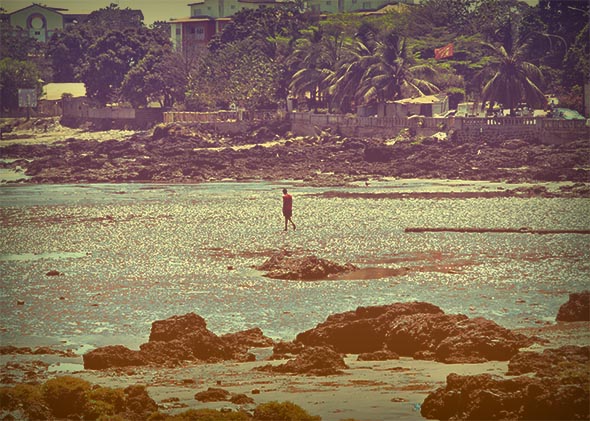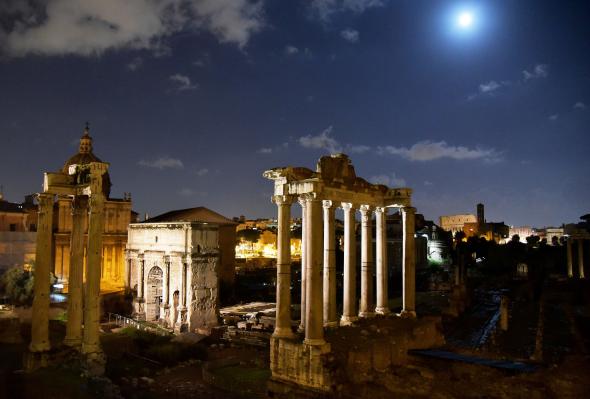Two Songs of Place and Displacement
Jacques Roumain’s “Guinea” and Giovan Francesco Vitale’s “Rome” imagine their settings as living things in history.

Photo illustration by Slate. Photo by Bate Felix/Reuters.
The 20th-century term DP, for displaced person, with its old overtones of slave labor, death camps, and forced migration, has expanded in meaning to include many forms of displacement. The condition, too, has expanded—in the 21st century, are more living people “displaced” than not?
A range of displacement, from genocide and exile all the way to economic migration and tourism, is suggested by Elsewhere, a fascinating book created by Eliot Weinberger for the Poetry Foundation in 2014: an anthology of 14 modern poems dealing with an unfamiliar setting, with examples including Federico García Lorca’s nightmare of New York, a Japanese poet visiting Paris, a Nicaraguan poet imagining Norway.
On that theme, here are two poems in English translation, one from Elsewhere and one much older. In quite different ways, both poems confront culture in relation to time. In both, the ancestral past is at once remote and immediate: lost, yet also enduring all around us, and inside us.
Any attempt at translation, knowingly or not, good or bad, must engage a braided web of remoteness and closeness. A translated poem can become a work of art in the new language, as it somehow incorporates that tangle of differences and similarities among languages and their histories.
First, here is a translation by Langston Hughes, from the Haitian French of his friend the poet and revolutionary Jacques Roumain:
“Guinea”
It’s the long road to Guinea
death takes you down.
Here are the boughs, the trees, the forest.
Listen to the sound of the wind in its long hair
of eternal night.
It’s the long road to Guinea
where your fathers await you without impatience.
Along the way, they talk.
They wait.
This is the hour when the streams rattle
like beads of bone.
It’s the long road to Guinea.
No bright welcome will be made for you
in the dark land of dark men:
Under a smoky sky pierced by the cry of birds
around the eye of the river
the eyelashes of the trees open on decaying light.
There, there awaits you beside the water a quiet village,
and the hut of your fathers, and the hard ancestral stone
where your head will rest at last.
Weinberger, in his note on Hughes’ translation, observes “a neglected story in the history of international modernism.” That is: “the network of poets that once existed across the African diaspora from the 1920s to the early 1970s, embracing such movements as Negritude and Black Nationalism, publishing and translating each other’s work in magazines in Africa, the U.S. and the Caribbean.” In her book Race, American Literature, and Transnational Modernisms, Anita Patterson describes Hughes’ friendship with Roumain, his protest at Roumain’s political imprisonment, and Roumain’s relation to many European and American modernists.
Hughes artfully conveys a layered urgency, the effort to imagine Africa as a kind of translation from the post-slavery experience of Haiti. The landscape is animated—“the wind in its long hair of eternal night,” “the eye of the river,” “the eyelashes of the trees”—and dreamy, rather than daylit. The road is long and mysterious, the ancestors are patient, emphasizing that the imaginative work of finding home is difficult, a pilgrimage that ends in “the hard ancestral stone.”
An interesting contrast, also involving ancient stone, is a poem written in Latin long after Latin was a spoken language. Even the 16th-century Italian poet’s pen name, Janus Vitalis Panormitanus, is a kind of translation of his actual name, Giovan Francesco Vitale, with the appended “of Palermo” relevant to the subject of place and displacement. In his poem, a stranger in Rome asks directions to Rome, unaware that he already is in Rome. The poem has been translated by Ezra Pound and Robert Lowell, but the version I love is by J.V. Cunningham:

Photo by Vincenzo Pinto/AFP/Getty Images
“Rome”
You that a stranger in mid-Rome seek Rome
And can find nothing in mid-Rome of Rome,
Behold this mass of walls, these abrupt rocks,
Where the vast theatre lies overwhelmed.
Here, here is Rome! Look how the very corpse
Of greatness still imperiously breathes threats!
The world she conquered, strove herself to conquer,
Conquered that nothing be unconquered by her.
Now conqueror Rome’s interred in conquered Rome,
And the same Rome conquered and conqueror.
Still Tiber stays, witness of Roman fame,
Still Tiber flows on swift waves to the sea.
Learn hence what Fortune can: the unmoved falls,
And the ever-moving will remain forever.
As Hughes does with Roumain, Cunningham finds an idiom that has conviction: the authority not just of speech, but of speech coming from a specific, particular voice and place. For Cunningham, the voice of classical aplomb: a 20th-century, Irish-American, working class scholar rendering the severe lyric voice of a 16th-century Italian humanist.
Partly lost in translation, and partly recalled by the fact of translation, are the European imperialist overtones and undertones of Roumain composing his poem “Guinea” in French. Similarly lost and recalled are the Imperial meanings and undercurrents of Vitale (or Panormitanus) composing “Rome” in Latin.
“Now conqueror Rome’s interred in conquered Rome” is a line to remember. It conveys the immensity of time along with its presence. I would say the same about “the long road to Guinea/ where your fathers await you without impatience,” “at the hour when the streams rattle/ like beads of bone.” There’s an exhilaration in these poems, with the costly instrument of French, English, Latin, turned toward the unexpected joy of arrival.